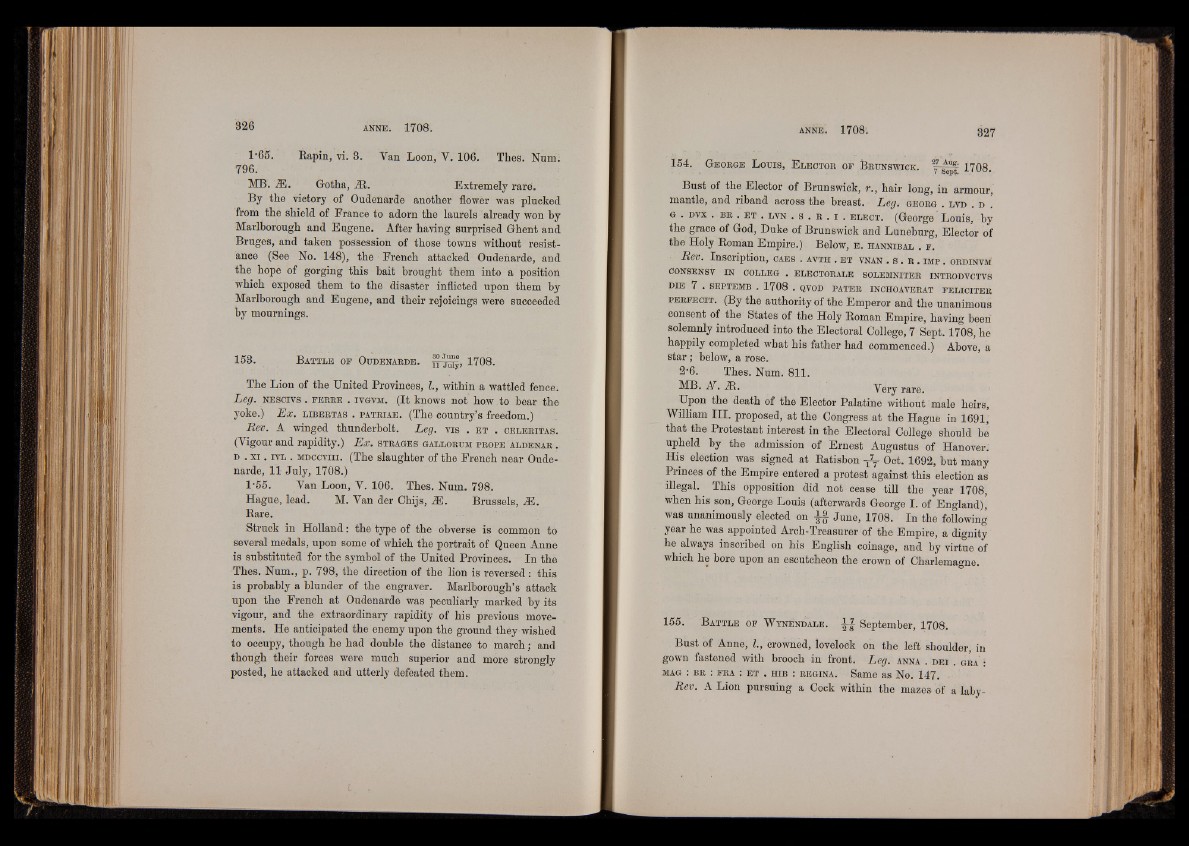
1'65. Rapin, vi. 8. Van Loon, V. 106. Thes. Num.
796.
MB. iE. Gotha, ^it. Extremely rare.
By the victory of Oudenarde another flower was plucked
from the shield of France to adorn the laurels already won by
Marlborough and Eugene. After having surprised Ghent and
Bruges, and taken possession of those towns without resistance
(See No. 148), the French attacked Oudenarde, and
the hope of gorging this bait brought them into a position
which exposed them to the disaster inflicted upon them by
Marlborough and Eugene, and their rejoicings were succeeded
by mournings.
153. B a t t l e o f O u d e n a r d e . f f ^ , 1708.
The Lion of the United Provinces, L, within a wattled fence.
Leg. n e s c iv s . f e r r e . iv g vm . (It knows not how to bear the
yoke.) Ex. l ib e r t a s . p a t r ia e . (The country’s freedom.)
Rev. A winged thunderbolt. Leg. vis . e t . c e l e r it a s .
(Vigour and rapidity.) Ex. s t r a g e s g a l lo r um p r o p e a ld e n a r .
d . x i . iv l . m d c c v iii. (The slaughter of the French near Oudenarde,
11 July, 1708.)
1*55. Van Loon, V. 106. Thes. Num. 798.
Hague, lead. M. Van der Chijs, M. Brussels, M.
Rare.
Struck in Holland: the type of the obverse is common to
several medals, upon some of which the portrait of Queen Anne
is substituted for the symbol of the United Provinces. In the
Thes. Num., p. 798, the direction of the lion is reversed: this
is probably a blunder of the engraver. Marlborough’s attack
upon the French at Oudenarde was peculiarly marked by its
vigour, and the extraordinary rapidity of his previous movements.
He anticipated the enemy upon the ground they wished
to occupy, though he had double the distance to march; and
though their forces were much superior and more strongly
posted, he attacked and utterly defeated them.
Bust of the Elector of Brunswick, r., hair long, in armour,
mantle, and riband across the breast. Leg. g eo r g . lv d . d
g . dvx . b r . e t . lv n . s . r . i . e l e c t . (George Louis, by
the grace of God, Duke of Brunswick and Luneburg, Elector of
the Holy Roman Empire.) Below, e . h a n n ib a l . f .
Rev. Inscription, ca e s . a v th . e t vnan . s . r . im p . ordinvm
CONSENSV IN COLLEG . ELECTORALE SOLEMNITER INTRODVCTVS
DIE 7 . SEPTEMB . 1708 . QVOD PATER INCHOAVERAT FELICITER
p e r f e c it . (By the authority of the Emperor and the unanimous
consent of the States of the Holy Roman Empire, having been
solemnly introduced into the Electoral College, 7 Sept. 1708, he
happily completed what his father had commenced.) Above, a
star; below, a rose.
2*6. Thes. Num. 811.
MB. N . At. Very rare.
Upon the death of the Elector Palatine without male heirs,
William III. proposed, at the Congress at the Hague in 1691,'
that the Protestant interest in the Electoral College should be
upheld by the admission of Ernest Augustus of Hanover.
His election was signed at Ratisbon Oct. 1692, but many
Princes of the Empire entered a protest against this election as
illegal. This opposition did not cease till the year 1708,
when his son, George Louis (afterwards George I. of England),
was unanimously elected on June, 1708. In the following
year he was appointed Arch-Treasurer of the Empire, a dignity
he always inscribed on his English coinage, and by virtue of
which he bore upon an escutcheon the crown of Charlemagne.
155. B a t t l e o f W y n e n d a l e . September, 1708.
Bust of Anne, I., crowned, lovelock on the left shoulder, in
gown fastened with brooch in front. Leg. anna . d e i . gra •
mag : b r : f r a : e t . h ib : r e g in a . Same as No. 147.
Rev. A Lion pursuing a Cock within the mazes of a laby